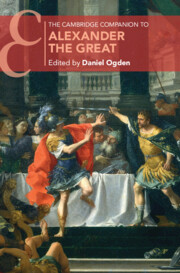Book contents
- The Cambridge Companion to Alexander the Great
- Cambridge Companions to the Ancient World
- The Cambridge Companion to Alexander the Great
- Copyright page
- Dedication
- Contents
- Figures
- Tables
- Maps
- Abbreviations
- Notes on Contributors
- Acknowledgements
- Introduction
- Part I Alexander’s Life and Career
- Part II Contexts
- 9 Macedonia
- 10 Kingship
- 11 Court and Companions
- 12 Changes and Challenges at Alexander’s Court
- 13 The Women of Alexander’s Court
- 14 Religion
- 15 Army and Warfare
- 16 Alexander’s Modern Military Reputation
- 17 Finance and Coinage
- 18 The Administration of Alexander’s Empire
- 19 Geography, Science and Knowledge of the World
- Part III The Historical and Biographical Tradition
- Part IV The Ancient World’s Memory of Alexander
- Alexander’s Timeline 356–321 BC
- References
- Index
- Cambridge Companions to the Ancient World
10 - Kingship
from Part II - Contexts
Published online by Cambridge University Press: 04 January 2024
- The Cambridge Companion to Alexander the Great
- Cambridge Companions to the Ancient World
- The Cambridge Companion to Alexander the Great
- Copyright page
- Dedication
- Contents
- Figures
- Tables
- Maps
- Abbreviations
- Notes on Contributors
- Acknowledgements
- Introduction
- Part I Alexander’s Life and Career
- Part II Contexts
- 9 Macedonia
- 10 Kingship
- 11 Court and Companions
- 12 Changes and Challenges at Alexander’s Court
- 13 The Women of Alexander’s Court
- 14 Religion
- 15 Army and Warfare
- 16 Alexander’s Modern Military Reputation
- 17 Finance and Coinage
- 18 The Administration of Alexander’s Empire
- 19 Geography, Science and Knowledge of the World
- Part III The Historical and Biographical Tradition
- Part IV The Ancient World’s Memory of Alexander
- Alexander’s Timeline 356–321 BC
- References
- Index
- Cambridge Companions to the Ancient World
Summary
The Argead Kingdom in Macedonia knew only primitive political institutions until the middle of the fourth century. Its Kings came from a family that had been divinely chosen and was differentiated from the rest of the population by a collective charisma. It was kept in power through its association with a Hetairoi (Companion) class, with which it socialized in symposia, which it fought with as cavalry in war, with which it hunted, sometimes for reasons of state. The royal hunt was sometimes more than a leisure activity, more than a bonding experience, and more than a preparation for war: it was one of a series of orchestrated showcases which validated and legitimized a King’s rule. In special hunts the King acted out the role of a hero, whose responsibility it was to protect all of his subjects from the forces of chaos both physical and metaphysical. As observers of the King’s prowess, the Hetairoi testified, where appropriate, to the King’s right to rule. Things began to evolve in Macedon at the end of the Peloponnesian War, but only picked up steam after the accession of Philip II. However, even as late as Alexander III, Macedonian expectations remained conservative and tradition-bound.
Keywords
- Type
- Chapter
- Information
- The Cambridge Companion to Alexander the Great , pp. 165 - 178Publisher: Cambridge University PressPrint publication year: 2024

